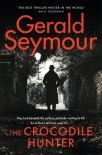The Crocodile Hunter by Gerald Seymour (english novels to improve english txt) 📗

- Author: Gerald Seymour
Book online «The Crocodile Hunter by Gerald Seymour (english novels to improve english txt) 📗». Author Gerald Seymour
He would be gone within an hour. He had one more call to make then he would be gone. The clock raced and there was no chance of serious reinforcement being granted him. But he preferred to carry his own responsibilities, not share them. It was a lousy night out there that he would soon be going into before improvement in the morning and probably turning into a lousy night where young Cameron was.
A priest had noted the presence of the gaunt young man at the evensong service. Had seen a tough and weathered face and the blemishes on it from acute sunburn and the blisters from insect bites, had been confused by the old man’s clothes he wore, but recognised him. Had always rather liked the boy. Had thought he had taken a generous and yet responsible line with him. Would not denounce him, not that evening. Would go in the morning, after Cameron Jilkes had visited his mother, spent a night in his own bed, and had then taken a bus into town to check himself in at the police station. He would go himself, but later. He would make an excuse to justify his delay in reporting the recognition. Had seen the face, had thought it haunted. Believed the experience of that form of warfare would have scarred deeply, and was pleased that the young man would spend time with his mother before surrendering.
It would be his last sight of the cloisters, the water tower, the treasury. He went past the garden where wild flowers grew out of the mortar binding the old stone walls. He had walked through the gravestones of men dead for centuries. Behind him was the building where once he would have been called “a chosen cherubim” or “that little angel”.
It had been, for Cammy, a pilgrimage before his main journey. Could not have gone, without it, to the place where he would attack, wreak – he believed – a fearful vengeance and give his name a resonance, would not be forgotten as were the men whose bones were lying beneath him. Other than in school holidays and occasional weekends, for two years the Choir House had been his home. He had worn a school uniform that would have singled him out from every other kid of his age on the estate above the village of Sturry; he would have known music that none of them knew; learned the basics of the Latin language that none of them would recognise. He came to the door of the boarding house and stopped. Why was he there? A fair enough question.
A woman came out. She glanced at him. She would have seen his scarred face and the stubble on his cheeks, and noticed the conservative jacket he wore and the anorak hooked over his shoulders, maybe seen a decent shirt and a sombre tie, and a pair of shoes that would have looked right at a bowls club committee meeting, and he was obviously loitering. She turned to face him, hands on her hips. Cammy turned away from her. He remembered the priest and the easy lie. The last time he had walked this path, around the cathedral’s outer walls, the tears had run on his face. His mother had carried his suitcase. Not much in it, a few books, a few games, and pyjamas. His school uniform, his robe and ruff, were left behind, would be allocated to another child. It was the last time he had cried.
Visitors to the cathedral had stopped and turned to stare at the child whose mother carried the case, and who marched him briskly towards an exit. One teacher had said to him that he should not feel any sense of guilt because his voice had suffered the inevitable changes of aging. Another had said that he was not “really cut out for this place, find somewhere that’ll make you happier”. A younger member of staff had remarked, “You’re not, frankly, your own best friend, Cameron, too full of argument.” His mother’s grip on his hand brooked no argument. They had almost reached the outer Christ Church Gate when she had jerked his arm.
She’d said, “Come on, get a grip and stop that bloody noise. They’re not worth it. Put them behind you . . . Those people that look down their long noses at us, they use the same hand as you when they wipe their bums. They’re no better than you . . .”
He had smeared an arm across his eyes, had blinked hard. Of course, then, had not known how but had made a promise that a price would be paid, and with interest.
He did not look back as he approached the gate. A price to be paid and a big one . . . would be done the following morning. He had all of them in his mind – Stanislau and Mikki and Tomas, Dwayne and Pieter, and Ulrike – and his stomach growled in hunger and the rain had come on heavier.
“Oh, for fuck’s sake . . .”
Dominic was at his car, a weight of gear dumped at his ankles, and his phone had beeped, and he’d checked the text.
“This is the bloody end . . .”
On the other side of the parking area, Babs had the boot of her car





Comments (0)